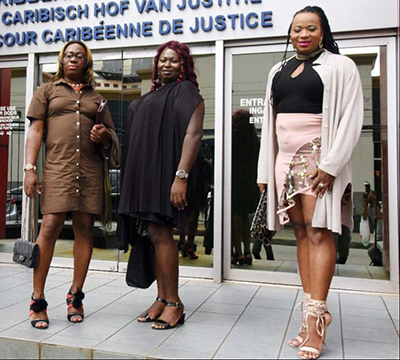A BILL which seeks to officially decriminalise the offence of ‘cross-dressing’ was read for the first time in the National Assembly Thursday last.
The bill seeks to amend the Summary Jurisdiction (Offences) Act of Guyana by deleting a section of the Act which makes it an offence for any person to dress as the opposite gender, in a public place, for any improper purpose.
The bill was presented by the Attorney General and Minister of Legal Affairs, Anil Nandall, S.C, and is intended to give effect to the Caribbean Court of Justice (CCJ) ruling in the case of Quincy McEwan and others v the Attorney General of Guyana [2018] CCJ 30 (AJ).

Section 152(1)(xlvii) of the Summary Jurisdiction (Offences) Act notes that any person who being a man, appears in any public place, for any improper purpose in female attire, or whether the situation be vice versa, shall be liable to a fine of not less than G$7,000. The CCJ in the McEwan case, ruled the provision to be unconstitutional and ordered that it be struck from the laws of Guyana.
In February 2009, Seon ‘Angel’ Clarke, dressed in a pink shirt and a pair of tights, with a black hairpiece, along with Quincy ‘Gulliver’ McEwan, were at North Road and King Street, Georgetown, when three policemen from the Brickdam Police Station arrested them; subsequently, on the same night, Joseph ‘Peaces’ Fraser and Seyon ‘Isabella’ Persaud were also arrested.
The four transgendered persons, who possess male primary sexual characteristics but identify with the female gender, were subsequently charged with the offence of Wearing Female attire contrary to the Act, to which they pleaded guilty and were fined G$7,000 each.
It was alleged that the then Chief Magistrate, Melissa Robertson at the hearing made comments about the transgendered persons being confused about their sexuality and told them they were men not women and needed to give their lives to Jesus Christ.
The transgendered persons then sought the advice of the Society Against Sexual Orientation Discrimination (SASOD) and filed a constitutional action, arguing that the law under which they were charged was inconsistent with the 1980 Guyana Constitution, and that the law violated their right to freedom of expression, since clothing is a form of expression that communicates ideas and representations of personality, identity and beliefs.
They also argued that the law violated their constitutional, guaranteed rights of equality and non-discrimination and they also challenged the conduct of the magistrate.
The High Court in 2013, and subsequently the Court of Appeal in 2017, were both reluctant to grant judgment in favour of the applicants, citing that the 1893 law was protected by the constitution savings law clause, which limits human-rights related constitutional challenges to laws that were in force before the 1980 constitution was given effect.
Then Chief Justice (ag) Ian Chang, S.C., had ruled that giving expression to one’s gender identity through clothing was not itself a crime. To constitute a crime, the expression must be in public for an ‘improper purpose.’
The matter made its way to the CCJ where the judges noted that by stigmatising those who do not conform to traditional gendered clothing and by criminalising aspects of transgendered people’s way of life, Section 153(1) violated Articles 149(1) and 149D of the Constitution of Guyana.
The right to freedom of expression is protected by Article 146 of the Constitution of Guyana, which gives every Guyanese the right to hold and communicate ideas and opinions without interference. The CCJ found that a person’s choice of attire is inextricably linked to the expression of his or her gender identity, autonomy, and individual liberty.
For this reason, the CCJ ruled that Section 153(1), by putting individuals under the constant threat that, at any moment, for an unconventional form of expression that poses no risk to society, they could be arrested, detained, charged, prosecuted, and convicted, violated Article 146 of the Constitution of Guyana.
The CCJ declared Section 153(1) inconsistent with the Constitution of the Co-operative Republic of Guyana, hence, that the provision was susceptible to being struck down and, in any event, to be rendered void.
The explanatory memorandum of the bill that was presented in the National Assembly explains that it seeks to delete Section 153(1)(xlvii), signalling the government’s commitment to respecting the human rights of all Guyanese.
“The government rightly acknowledges and agrees with the CCJ that this archaic law, which is inconsistent with the Constitution of Guyana, has no social or legal purpose in a progressive society,” the explanatory memorandum notes.
Joel Simpson, Founder and Managing-Director of SASOD Guyana, told the Sunday Chronicle that “the symbolism of government bringing a bill to the House … says to the population that this particular government which wasn’t in office at the time the decision was made, is re-enforcing that they respect the rule of law and the decision of the court and that symbolism is important.”











